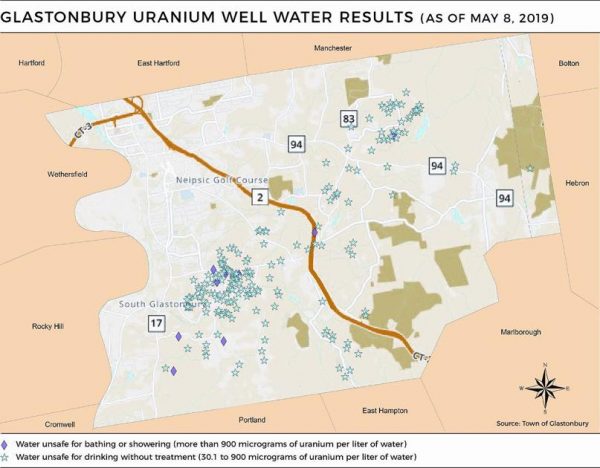
GLASTONBURY — A national organization that promotes “community science” has recruited three scientists from far-flung parts of the country to work as volunteers in helping Glastonbury study scientific issues related to the pollution of private drinking-water wells with uranium and related chemicals, such as radium.
Local officials have been talking with the scientists about plans for the research. But, so far, the scientists haven’t visited Glastonbury, according to town Health Director Wendy Mis.
“It’s been a lot of conference calls at this point,” she said, adding that, at this stage of the project, “a lot of it can be done remotely.”
In another development related to the town’s efforts to learn more about the uranium problem, local officials announced Monday that they are communicating with officials in Wake County, North Carolina, which has also encountered problems with naturally occurring uranium polluting private wells.
The Washington, D.C.-based Thriving Earth Exchange, which is associated with the American Geophysical Union, says on its website that its Glastonbury team has identified four primary objectives for the research project. They are:
• “Gain a further understanding of the impacts of naturally occurring uranium contamination on human health;
• “Understand the factors (e.g. bedrock, well depth/location) that change or contribute to well water contaminants (e.g. uranium) in groundwater;
• “Understand how other U.S. communities have been affected by naturally occurring uranium contamination and how they addressed it, including use and impact of water treatment wastewater disposal systems;
• “Develop a public communication campaign on the dangers of uranium contamination to share with residents along with recommendations on how to proceed in the best interest of the community.”
The most senior scientist working on the project is Assistant Professor Hari Kandel of the School of Natural Resources and the Environment at Lake Superior State University in Sault Sainte Marie, Michigan.
Kandel, who receive his doctorate in 2015 from Florida International University in Miami, has masters degrees from Bowling Green State University in Ohio and Tribhuvan University in Nepal. One of the courses he teaches is entitled, “Hydrologic Systems: Surface and Groundwater.”
Working with Kandel will be two doctorate students, Rachel Coyte of the Nicholas School of the Environment at Duke University in North Carolina and Caitlyn Hall of Arizona State University.
In North Carolina, Evan Kane, Wake County’s groundwater protection and wells manager, said the county and Glastonbury are “in similar places” on the issue.
Wake County sent out about 19,000 mailers last summer to homes in the area considered most at risk for uranium, radon, and radium pollution, suggesting that homeowners have their well water tested for the contaminants. Wake County has offered to help residents who “meet certain income guidelines” pay the hundreds of dollars a well test can cost.
Glastonbury has gone farther. Working with the state Department of Public Health, the town last year offered free testing to residents all over town.
Maps published by the town show considerably more than 150 elevated test results, with the vast majority in the 30- to 900-microgram-per-liter range that is considered unsafe for drinking but safe for bathing and showering.
Kane said many affected Wake County residents are “far outside the span” of public water systems, and that extending water mains would often be “cost prohibitive.” Glastonbury has run into similar issues with water-main extension proposals, although three limited extensions have gone forward.
“There’s unfortunately no magic wand,” Kane said.